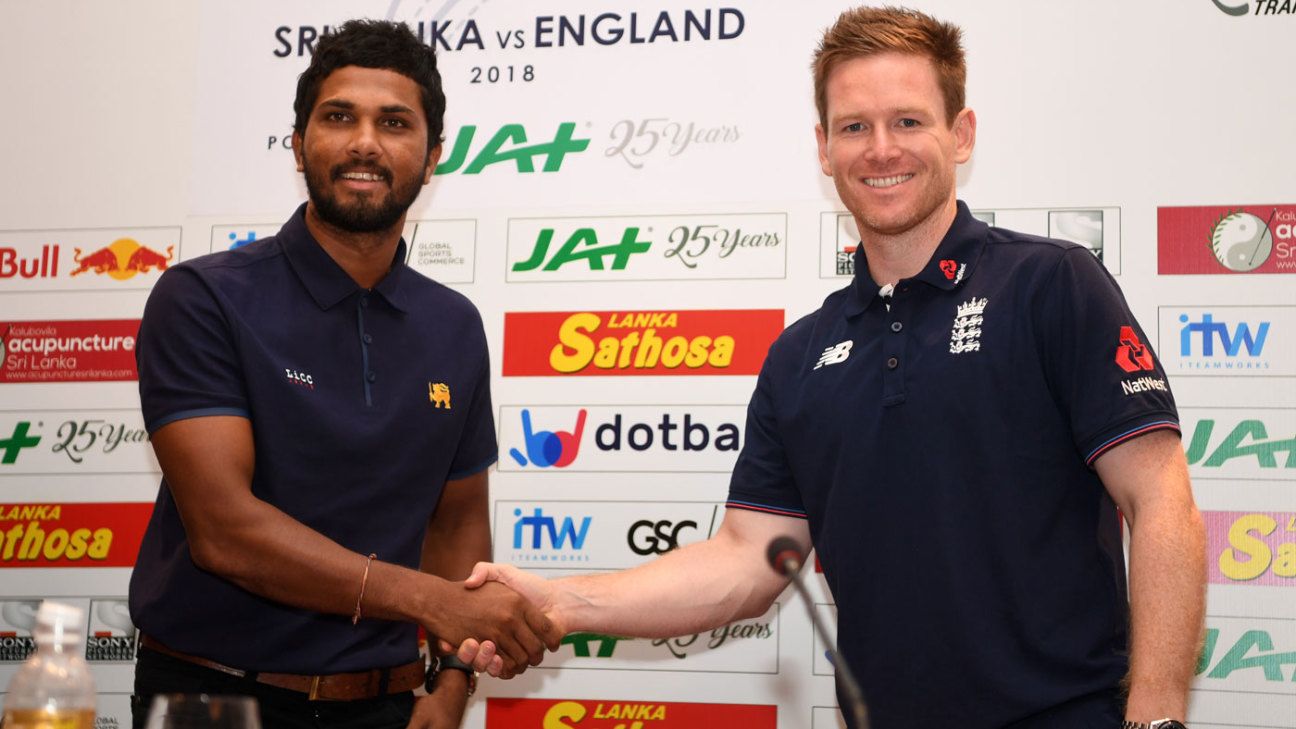Question marks over the limited-overs captaincy ahead of a World Cup year? Check. A team low on confidence following a prolonged period of underperformance in 50-over affairs? Check. A young but talented squad that frequently falls short as they come to terms with the demands of a new, high intensity style of cricket? Check.
Four years apart and the narrative surrounding England’s tour of Sri Lanka remains unchanged, apart from of course some mild role reversal.
In 2014, England, then as now, toured Sri Lanka with the World Cup on the horizon. They would end up losing the ODI series 5-2 to a Kumar Sangakkara-inspired opposition, though the real horror would hit at the World Cup where they would suffer the ignominy of a group-stage exit.
“We were just two teams at very different stages of their cycles,” said Eoin Morgan, England’s captain now but vice-captain to Alastair Cook on that 2014 tour. “We were still trying to play a style which didn’t come natural to us, and we struggled to take wickets, we struggled to get Kumar out. He played extremely well in that series, and Mahela [Jayawardene] played really well as well.”
Since that nadir, however, England have squared off in 17 bilateral ODI series and won all but four – two losses away to India and South Africa, one at home to Australia, and the other a one-off ODI against Scotland last summer.
Much of this success has revolved around a core group of players: Moeen Ali, Jos Buttler, Alex Hales, Eoin Morgan, Joe Root, Ben Stokes, and Chris Woakes. All of whom were on that tour to Sri Lanka in 2014, and are now back again four years later. Not many sides in world cricket can point towards such an unflinching selection policy, but it is this ability to stay the course in terms of long-term ambition which is now reaping irrefutable dividends for an English side that, in the past, has been dearly lacking in vision.
“It’s been quite a long process, well thought-out, well planned,” said Morgan at the launch of the ODI series in Colombo. “But I think, to a point, to execute it we still have a long way to go. It’s taken us three and a half years to get to where we are, but I think we’re getting to the most important part of what we’ve been planning towards.
“I think the players have done an exceptional job, gelled well as a team, and we’ve bought into the way that we want to play.”
Key to this revolution has been Andrew Strauss, who on Wednesday stepped down as director of England cricket after three-and-a-half years in the role. Strauss has been credited for placing renewed emphasis on limited-overs cricket during his tenure, and Morgan was full of praise for the former England captain.
“He’s been at the forefront of it, he’s been incredibly instrumental in his forward thinking and planning to get us to the position of where we are at the moment.
“If you go back to the start of our summer in 2015 and the direction given by him to myself, the team, as well as the selectors, was to build something that will prepare us for the 2019 World Cup. Without that direction we wouldn’t have been allowed the freedom to play in the manner we have.”
For Sri Lanka, though, such direction has been sorely lacking since that same summer. The losses of players such as Sangakkara, Jayawardene and Tillakaratne Dilshan have been keenly felt, while selection policy has been muddled with players and spectators alike increasingly lacking faith in the process.
Head Coach Chandika Hathurusinghe, who was brought in at the start of the year to install a degree of control to the ever-increasing chaos, has also foregone long-term planning in favour of short-term success at the 2019 World Cup.
This has led to Hathurusinghe tinkering consistently with his team’s make-up to counteract the strengths of the opposition, a far cry from the clear-eyed vision of the English leadership think-tank.
“I think everywhere we travel and everywhere we play presents different challenges,” said Morgan. “Also I think trying to apply our game-plan around the world presents different kinds of pressures and different challenges within our group.
“It’s something I think over the last few years that we’ve done well as a team, and it’s helped us grow as a side. Certainly last winter away against New Zealand and Australia, we played in all types of conditions, some extremely challenging, and some where we felt at home too. So I think Sri Lanka will present challenges like that.”
With five ODIs, a one-off T20I, and three Tests scheduled, this tour will certainly be a challenge for both sides. For England though it’s merely the next step in their ultimate goal of a home World Cup victory.
“Focusing on the process that got us here and not getting overwhelmed is the main thing,” said Morgan.
For Hathurusinghe and company, it’s a chance to pit themselves against the best, though as the series gears up, the differences between the two sides are too vast to ignore. Sri Lanka may put up a fight, and may even pull off a surprise. However, if they are to be a consistent force they need not look too far for their blueprint.
